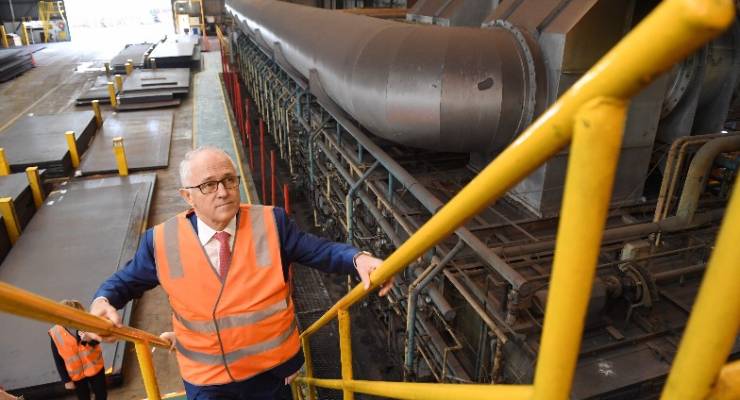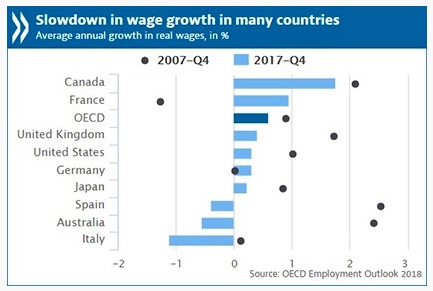
A new OECD study has debunked long-standing business arguments that industrial relations deregulation will lead to higher wages growth or higher employment.
The study also endorses systems like Australia’s where collective bargaining takes place at the enterprise level but allows for coordination across sectors and the economy.
The study, for of the OECD Employment Outlook for 2018 released this week, examines different industrial relations systems across the developed world, splitting them into five groups based on where bargaining occurs — from completely centralised economy-wide bargaining to fully decentralised firm-level — and the degree of coordination of wage outcomes across sectors. Australia’s system is in the fourth group, “largely decentralised”, where bargaining is firm-level but an element of sector-level bargaining or wage coordination is provided (in our case, by the awards system and the national minimum wage case). That’s in contrast to the “fully decentralised” model of countries like the US that the Business Council and the mining industry continue to push for Australia to adopt, and which some neoliberal economists claim will increase wages.
The study finds that IR systems where there’s a high level of coordination — like Australia’s — tend overall to be linked to higher employment and lower unemployment than US-style no-regulation models. Systems with firm-level bargaining also produce better wages for workers than either more centralised systems (i.e. sector-level bargaining) or individual-contract systems of the Workchoices kind that Australian business wants to return to. In findings that have implications for inequality, however, more centralised systems where bargaining occurs at the sector level produce less difference between wage outcomes than firm-level bargaining systems, or individual contract systems.
And there is a link between lower flexibility and lower productivity, as business maintains: centralised systems are linked to lower productivity than less-centralised systems such as firm-level bargaining systems. But systems with stronger coordination, like Australia’s, are not linked to lower productivity — suggesting that there are no substantial productivity gains to be found by Australia further deregulating its system for the much-vaunted “flexibility”.
The report also tackles the issue of wage stagnation across developed economies — which the OECD suggests in an accompanying graph has been more pronounced in Australia than in other countries.

It offers the OECD’s perspective on why wage stagnation is affecting so many countries. The first point, it argues, is productivity growth has been lower than in recent decades (although, as we’ve seen in Australia, stronger productivity growth hasn’t led to higher wages growth recently). It makes a point similar to the convoluted explanation offered recently by Reserve Bank governor Philip Lowe, that it is firms on the technological frontier that are enjoying strong productivity growth while many others lag behind them — but those firms invest far more in capital than in labour, which means even high-productivity firms aren’t helping push wages up.
The second — which is also one of the traditional explanations of low wages growth — is that certain types of high-skill jobs are in high demand but most workers don’t have the training and skills to access them. The third — which could be a significant new insight into the issue — is that ever-more draconian welfare policies are forcing the unemployed to take any job they can, even if it pays far less than their skills warrant, and even if it entails far fewer hours than they are prepared to work, thus pushing down wages growth more broadly. In this context, the refusal of successive Australian governments to increase Newstart may have helped push down wages growth. And finally, the OECD urges “addressing the long-term decline in union membership and eroding role of collective bargaining.”
The report adds to the growing acknowledgement by official sources that wage stagnation is not merely a cyclical phenomenon that will vanish “next year” (with “next year” being constantly pushed back, as it has in our budget) but reflects structural changes that policymakers have to deal with — and they include the industrial relations landscape. Philip Lowe has recently ventured somewhat tentatively into those same waters. When will the government start to acknowledge reality as well?









But this is Oz – even “the laws of mathematics do not apply'” here. Ask the Wizard.
Just like tax cuts, low wages are a gift to the big end of town, in more ways than we might imagine. In our current state not many in positions to impact or drive the welfare of the common citizen appears to wants to drive it anywhere but down. They know, of course, where the dire prospects of the citizenry are headed, because they are the conductors of it. They appear to give not a fig for it (graphs included). Even with lower wages and fewer hours, and the subsequent windfall of paying much less in entitlements such as holidays and sick leave, employers in some industries go even further. They pay low, they pay late or they don’t pay at all unless made to by the courts. Who knows how long the power of these courts will endure. They won’t be happy until we are working their land (formerly our land) renting their cottages (formerly our cottages) and made to give them half of the produce we will be forced to grow in our backyards (or balcony) to survive.
It’s easy to be lulled into thinking it’s just a bump in the economy which will return to normal in due course as it always has. Sad to say we are looking at the new normal and, I fear, we will see plenty more new normals in our different future.
And so another Liberal myth lies on its death bed. As with ‘trickle down economics’ it will take a long time to actually die and disappear from the conservative mantra. Look how the Libs are still desperately hanging on to ‘the benefits’ of big business tax cuts. So, where are you Labor?
Where are Labor? The same place they’ve been for the last few decades- pushing the same conservative line as the Coalition with prettier lipstick.
Matthias Cormann was right to remind Penny Wong her party pushed for corporate tax cuts not so long ago, too. And the rest.
The ALP, having seen to the neutering of the Union movement, thanks for that Bob and Paul, have now jumped into bed with the landed gentry and the pinstripe set on the road to whatever the hell neo-liberalism is.
Only expedient contrarianism is stopping Bowen from embarking on the same corporate tax relief that the innumerate Morrison and Corman are championing. Meanwhile wages are going worse than no-where as the transition for your children, from middle class to working poor is almost upon us.